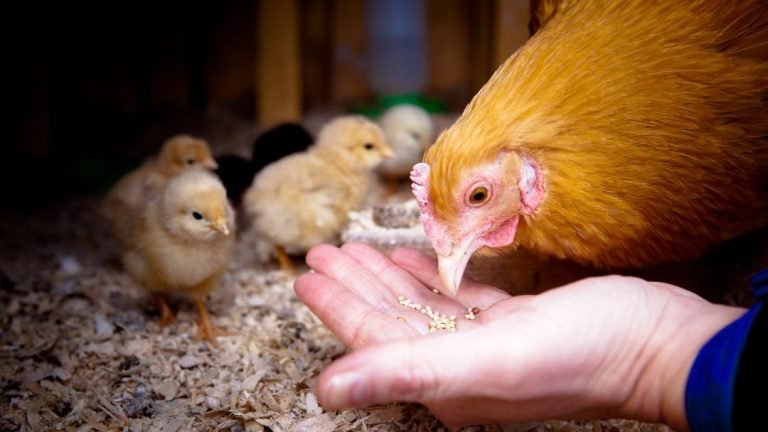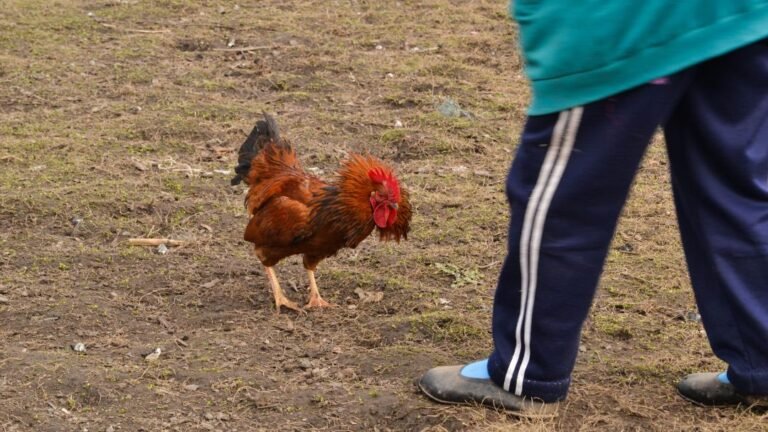Chickens cannot eat onions as they are toxic to them. Here is why you should not feed onions to your flock.
Onions contain a substance called thiosulphate, which can cause anemia in chickens by destroying their red blood cells. This can lead to weakness, lethargy, and even death in severe cases. Additionally, onions can cause digestive issues in chickens, including diarrhea and stomach upset.
Therefore, it is crucial to keep onions out of their diet to ensure their health and well-being. Instead, focus on feeding them a balanced diet of grains, vegetables, and high-quality chicken feed to meet their nutritional needs. By doing so, you can keep your chickens happy and healthy.
Understanding The Risks Of Feeding Onions To Chickens
When it comes to feeding our feathered friends, we must be cautious about the foods we offer them. Onions, a popular cooking ingredient, may seem harmless to us, but can chickens eat onions without any negative consequences? In this article, we will delve into the potential risks and health hazards associated with feeding onions to chickens. By understanding onion toxicity and its effects on poultry, we can make informed decisions about our chickens’ diet and ensure their well-being.
Possible Health Hazards Of Onions In Chicken Diets
Onions contain compounds that can be toxic to chickens when consumed in large quantities. One of these compounds, called N-propyl disulfide, can cause damage to the red blood cells in chickens, leading to a condition called hemolytic anemia. This can result in weakness, lethargy, pale combs, and potentially even death. In addition, onions contain thiosulphate, a substance that can disrupt the functioning of an enzyme called cytochrome oxidase. This enzyme plays a crucial role in oxygen transport and energy production within the body. Any disruption to its function can have serious consequences for the overall health of a chicken.
While small amounts of onion may not cause immediate harm, regular or excessive consumption can accumulate these toxins in a chicken’s system over time, causing chronic health issues. It is important to note that even cooked or processed onions can still retain some of these harmful compounds, so it is best to err on the side of caution and avoid feeding onions to chickens altogether.
Overview Of Onion Toxicity And Its Effects On Poultry
Onion toxicity in chickens is a real concern for poultry owners. When chickens ingest onions, the harmful compounds present in the vegetable can be absorbed into their bloodstream, leading to adverse effects. As mentioned earlier, the N-propyl disulfide in onions can damage red blood cells, leading to anemia. Chickens affected by onion toxicity may exhibit symptoms such as weakness, decreased appetite, pale wattles, and a drop in egg production. In severe cases, chickens may even experience organ failure and death.
It’s crucial to ensure that chickens have a well-balanced and appropriate diet to maintain their optimal health and productivity. While onions may seem like harmless kitchen scraps, the potential risks they pose to chickens are significant. By avoiding onions in their diet, poultry owners can minimize the chances of onion toxicity and safeguard the well-being of their feathered companions.
Signs And Symptoms Of Onion Toxicity In Chickens
Onions are a common ingredient found in many kitchens around the world, but did you know that they can be toxic to chickens? It’s essential for poultry owners to be aware of the signs and symptoms of onion toxicity in chickens to ensure their flock stays healthy and safe. Understanding these symptoms can help you take prompt action if you suspect your chickens have ingested onions.
H3 Recognizing The Signs Of Onion Poisoning In Chickens /h3
Chickens affected by onion toxicity may exhibit various signs, allowing you to identify the condition early on. Keep an eye out for the following indicators:
- Loss of appetite
- Lethargy or weakness
- Difficulty breathing
- Discolored urine
- Pale comb and wattles
- Diarrhea or changes in droppings
- Increased thirst
- Labored or abnormal breathing
- Swelling or edema of the face, eyes, or legs
- Depression or listlessness
If you notice any of these signs in your chickens, there is a possibility they have consumed onions and are experiencing onion toxicity. In such cases, it is essential to act quickly to prevent further complications that may arise from onion consumption.
H3 Common Symptoms Exhibited By Chickens Affected By Onion Toxicity /h3
Chickens affected by onion toxicity may show a range of symptoms, reflecting the impact of onion ingestion on their bodies. Some common symptoms exhibited by chickens affected by onion toxicity include:
- Gastrointestinal upset: Chickens may experience vomiting, diarrhea, or changes in their droppings due to the irritant effect of onions on the digestive system.
- Anemic symptoms: Onions contain compounds that can destroy red blood cells, leading to anemia in chickens. Symptoms of anemia may include pale comb and wattles, weakness, and lethargy.
- Breathing difficulties: The presence of onions in their system can cause respiratory distress in chickens. They may exhibit difficulty breathing, labored breathing, or abnormal respiratory sounds.
- Swelling: Onion toxicity can cause swelling or edema of various body parts, such as the face, eyes, or legs. This swelling is a result of the inflammatory response triggered by onion ingestion.
- Depression and weakness: Chickens affected by onion toxicity may appear depressed, listless, or generally weak. They may spend more time resting and exhibit a decreased interest in their surroundings.
Learning to recognize these common symptoms can help you take appropriate action if you suspect your chickens have consumed onions. Swift intervention can help mitigate the effects of onion toxicity and aid in the recovery of your flock.
The Mechanism Behind Onion Toxicity In Chickens
Understanding How Onions Affect The Digestive System Of Chickens
Onion toxicity in chickens is a serious concern that poultry farmers should be aware of. When chickens consume onions, it can lead to a series of digestive issues and potentially be fatal for these feathered friends. To understand this mechanism, we need to delve into how onions affect the digestive system of chickens.
Chickens have a relatively sensitive digestive system, which is why their diet requires careful consideration. Onions contain certain compounds that can pose a significant threat to their well-being. These compounds interfere with the normal functioning of the digestive system, resulting in adverse effects on their overall health.
The Specific Compounds In Onions That Are Toxic To Poultry
It’s crucial to identify the specific compounds in onions that are toxic to poultry as they play a key role in understanding the risks associated with feeding onions to chickens.
The primary culprits in onions are a group of sulfur-containing compounds known as organosulfides. These compounds, such as n-propyl disulfide, disulfides, and thiosulfinates, are responsible for the distinct pungent smell and taste of onions that humans find appealing but can be detrimental to chickens.
When chickens consume these compounds, they undergo a process called oxidative stress. The organosulfides in onions can disrupt the normal functioning of enzymes in the chickens’ digestive system, leading to a cascade of negative effects.
| Specific compounds | Toxicity level |
|---|---|
| n-propyl disulfide | High |
| disulfides | Moderate |
| thiosulfinates | High |
As shown in the table above, these compounds differ in their toxicity levels. However, any amount of these substances can be harmful to chickens, even in small quantities.
The toxic effect of these compounds on chickens includes damage to their red blood cells, leading to anemia, and disruption of their gut flora. Additionally, the disulfides and thiosulfinates can cause oxidative damage to the cells in the intestine, resulting in inflammation and impaired nutrient absorption.
It’s important to emphasize that under no circumstances should chickens be fed onions. The potential risks outweigh any perceived benefits, and it’s always better to err on the side of caution when it comes to the health of our poultry friends.
Prevention And Treatment Of Onion Toxicity In Chickens
When it comes to raising backyard chickens, it is crucial to be aware of the potential dangers of certain foods that can be toxic to these feathered friends. Onions, in particular, are known to be harmful to chickens and can cause a condition known as onion toxicity. Preventing onion poisoning in chickens, and knowing the steps to take if they accidentally consume onions, is essential to ensure the health and well-being of your flock.
Best Practices For Preventing Onion Poisoning In Chickens
Implementing simple but effective prevention measures can go a long way in keeping your chickens safe from onion toxicity. By following these best practices, you can minimize the risk:
- Avoid feeding onions to your chickens directly or in any form.
- Ensure that your chicken feed does not contain any onion products or by-products.
- Be mindful of what you offer as treats, as some commercially available treats may contain onion flavoring.
- Store onions securely in a location that is inaccessible to your chickens.
- Dispose of any onion scraps in a sealed container or compost bin, away from your flock’s reach.
Steps To Take If A Chicken Accidentally Consumes Onions
In the unfortunate event that one of your chickens ingests onions, prompt action is necessary to mitigate the harm caused. Follow these steps:
- Remove any remaining onions or onion-containing food from the chicken’s reach immediately.
- Observe the affected chicken closely for any signs of onion toxicity, such as weakness, diarrhea, or lethargy.
- Offer the chicken plenty of fresh water to drink, as it can help dilute the toxins and support their system.
- If symptoms persist or worsen, seek veterinary assistance without delay. They will be able to provide specific guidance and potentially administer treatment if necessary.
By applying these preventative measures and knowing how to respond if a chicken accidentally consumes onions, you can ensure a safe and healthy environment for your flock. Remember, vigilance is key to minimizing the risks associated with onion toxicity and protecting your chickens from harm.
Safe And Healthy Alternatives To Onions For Chickens
While onions may be a staple in our diets, they can actually be harmful to chickens if consumed in large quantities. Onion toxicity in chickens can lead to anemia, digestive issues, and even death. As a responsible chicken owner, it’s important to be aware of the potential dangers that onions pose to these feathered friends. Luckily, there are plenty of safe and healthy alternatives to onions that can be included in a chicken’s diet to ensure they receive the necessary nutrients. In this article, we will explore some nutritious food options that can be fed to chickens instead of onions.
Nutritious Food Options That Can Be Fed To Chickens Instead Of Onions
When it comes to providing a well-balanced diet for poultry, it’s important to consider the nutritional needs of chickens. Fortunately, there are several alternatives to onions that can offer similar nutritional benefits without the risk of toxicity. These safe and healthy options include:
- 1. Garlic: Just like onions, garlic belongs to the allium family, but it is considered safe for chickens in moderation. Garlic can help boost their immune system and has natural antibacterial properties.
- 2. Herbs: Herbs like parsley, oregano, and thyme are not only flavorful but also provide vitamins, minerals, and antioxidants to support the overall health of your flock. These can be easily grown in your garden or purchased at a local grocery store.
- 3. Leafy greens: Spinach, kale, and lettuce are excellent sources of essential vitamins and minerals for chickens. These leafy greens can be offered fresh or chopped and mixed into their regular feed.
- 4. Fruits: Chickens love the sweet taste of fruits, and they are a great source of vitamins and fiber. Apples, berries, melons, and bananas are all safe options to include in their diet. Just be sure to remove any seeds or pits that could be choking hazards.
- 5. Grains: Grains like corn, barley, and oats are a staple in many chicken feed formulas. They provide energy, protein, and essential nutrients to support healthy growth and egg production.
Tips For Creating A Well-balanced Diet For Poultry Without Onions
Creating a balanced diet for your chickens requires careful consideration of their nutritional needs. Here are some tips to ensure their diet remains nutritious and onion-free:
- 1. Variety is key: Offer a diverse range of foods to ensure that your chickens receive a wide array of nutrients.
- 2. Consult with a poultry nutritionist: If you’re unsure about the appropriate diet for your chickens, it can be helpful to consult with a poultry nutritionist. They can provide guidance tailored to the specific needs of your flock.
- 3. Consider commercial feed options: High-quality commercial feeds are formulated to meet the nutritional requirements of chickens. These feeds often contain a mixture of grains, proteins, vitamins, and minerals.
- 4. Provide access to fresh water: Clean, fresh water should always be available to chickens to support their overall health and digestion.
- 5. Monitor for signs of deficiency or illness: Keep an eye out for any changes in your chickens’ behavior, such as decreased egg production or weight loss. These signs may indicate a nutritional deficiency or illness and should be addressed promptly.
By implementing these safe and healthy alternatives and following these tips, you can ensure that your chickens receive a well-balanced diet without the risk of onion toxicity. Remember, a healthy diet leads to happy and thriving chickens!
Conclusion
To conclude, it’s important to understand that while chickens can eat onions in small quantities without adverse effects, excessive consumption can lead to onion toxicity, causing their red blood cells to burst and potentially leading to anemia. It’s best to err on the side of caution and limit onion intake or avoid feeding them to your feathered friends altogether.
Prioritizing their health and wellbeing is crucial for keeping your flock happy and thriving.




